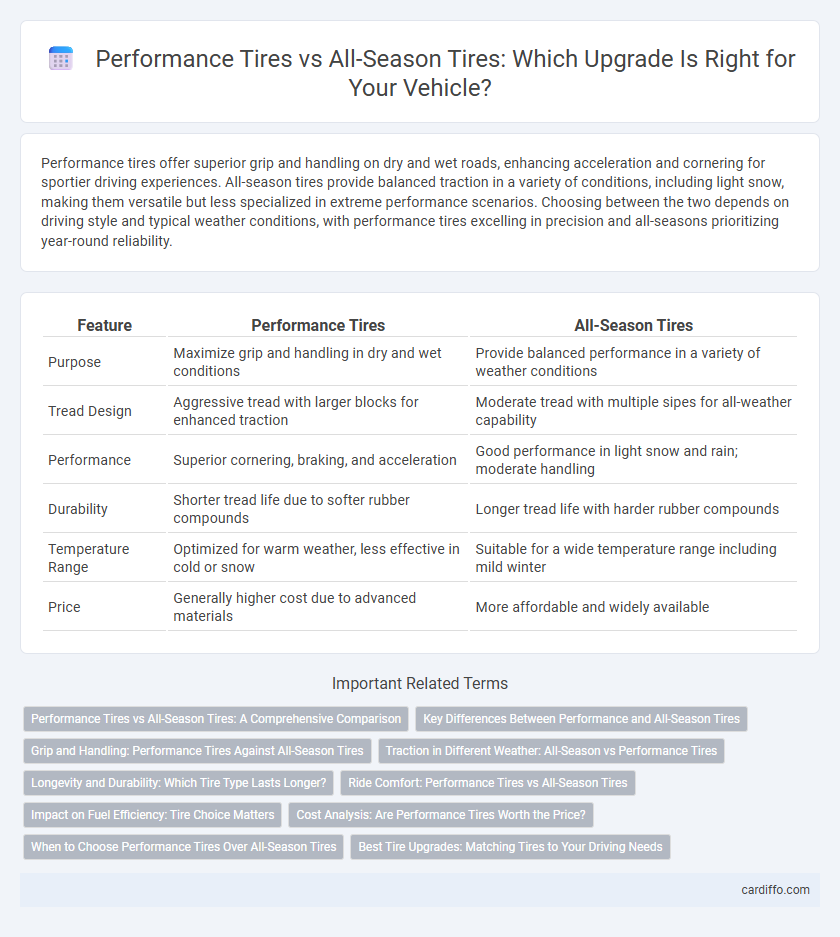Performance tires offer superior grip and handling on dry and wet roads, enhancing acceleration and cornering for sportier driving experiences. All-season tires provide balanced traction in a variety of conditions, including light snow, making them versatile but less specialized in extreme performance scenarios. Choosing between the two depends on driving style and typical weather conditions, with performance tires excelling in precision and all-seasons prioritizing year-round reliability.
Table of Comparison
| Feature | Performance Tires | All-Season Tires |
|---|---|---|
| Purpose | Maximize grip and handling in dry and wet conditions | Provide balanced performance in a variety of weather conditions |
| Tread Design | Aggressive tread with larger blocks for enhanced traction | Moderate tread with multiple sipes for all-weather capability |
| Performance | Superior cornering, braking, and acceleration | Good performance in light snow and rain; moderate handling |
| Durability | Shorter tread life due to softer rubber compounds | Longer tread life with harder rubber compounds |
| Temperature Range | Optimized for warm weather, less effective in cold or snow | Suitable for a wide temperature range including mild winter |
| Price | Generally higher cost due to advanced materials | More affordable and widely available |
Performance Tires vs All-Season Tires: A Comprehensive Comparison
Performance tires deliver superior handling, responsiveness, and traction on dry and wet roads by utilizing softer rubber compounds and specialized tread designs, ideal for sports cars and aggressive driving. All-season tires provide balanced performance across various weather conditions, including light snow, with harder compounds that extend tread life and enhance fuel efficiency, catering to everyday commuting needs. Choosing between performance tires and all-season tires depends on driving style, climate, and vehicle requirements for optimal safety and performance.
Key Differences Between Performance and All-Season Tires
Performance tires offer superior grip, handling, and responsiveness on dry and wet roads due to their specialized rubber compounds and tread patterns, ideal for high-speed driving and cornering stability. All-season tires prioritize versatility with balanced traction across diverse weather conditions, including light snow, providing longer tread life and enhanced comfort for everyday driving. The key differences lie in tread design, rubber composition, and intended use, where performance tires sacrifice longevity for maximum performance, while all-season tires emphasize durability and reliability in varied climates.
Grip and Handling: Performance Tires Against All-Season Tires
Performance tires deliver superior grip and handling compared to all-season tires due to their softer rubber compounds and specialized tread patterns designed for maximum traction. These tires excel in cornering and braking responsiveness, providing enhanced control in dry and wet conditions. All-season tires offer versatility and durability but sacrifice the optimized grip and precision that performance tires provide for spirited driving.
Traction in Different Weather: All-Season vs Performance Tires
Performance tires deliver superior traction on dry and wet roads due to their specialized rubber compounds and tread patterns designed for maximum grip, especially in warm weather conditions. All-season tires provide balanced traction across a variety of conditions, including light snow and mild rain, by incorporating tread designs and rubber compounds that remain flexible in a wider temperature range. Choosing performance tires enhances precision and cornering on dry pavement, while all-season tires ensure safer, more reliable traction in diverse weather conditions.
Longevity and Durability: Which Tire Type Lasts Longer?
Performance tires typically offer enhanced grip and handling but tend to have softer rubber compounds that wear faster, resulting in shorter tread life compared to all-season tires. All-season tires are engineered with harder rubber compounds and deeper tread patterns, providing superior longevity and better resistance to wear over diverse road conditions. For drivers prioritizing tire durability and extended mileage, all-season tires generally outlast performance tires by a significant margin.
Ride Comfort: Performance Tires vs All-Season Tires
Performance tires offer enhanced road grip and responsiveness, resulting in a sportier drive but often compromise ride comfort due to stiffer sidewalls and less cushioning. All-season tires prioritize comfort with softer rubber compounds and more flexible sidewalls that absorb road imperfections, ideal for smooth, quiet rides across various conditions. Choosing between them depends on balancing the need for precise handling with a desirable, comfortable driving experience.
Impact on Fuel Efficiency: Tire Choice Matters
Performance tires, designed for enhanced grip and handling, typically have softer rubber compounds and more aggressive tread patterns that increase rolling resistance, leading to reduced fuel efficiency compared to all-season tires. All-season tires feature harder compounds and optimized tread designs that minimize rolling resistance, improving fuel economy on a variety of road conditions. Choosing all-season tires over performance tires can result in noticeable fuel savings during daily driving and long-distance travel.
Cost Analysis: Are Performance Tires Worth the Price?
Performance tires typically cost 20-50% more than all-season tires due to advanced rubber compounds and tread designs that enhance grip and handling. While they offer superior traction in dry and wet conditions, their shorter tread life and higher replacement frequency can increase long-term expenses. For drivers prioritizing consistent performance and cornering precision, the upfront investment in performance tires often justifies the added cost compared to the versatility and longevity of all-season tires.
When to Choose Performance Tires Over All-Season Tires
Performance tires offer superior grip, handling, and braking capabilities ideal for high-speed driving and sporty vehicles, especially in dry or wet conditions. Choose performance tires when precise cornering, enhanced responsiveness, and maximum traction are priorities, particularly during summer or in regions with mild climates. All-season tires provide versatility and durability for variable weather, but performance tires excel for drivers seeking optimized driving dynamics and improved road feedback.
Best Tire Upgrades: Matching Tires to Your Driving Needs
Performance tires deliver superior grip and handling for spirited driving and high-speed cornering, making them ideal for enthusiasts who prioritize responsiveness and precision. All-season tires offer versatile traction and durability across various weather conditions, providing balanced performance for daily commuting and mixed climates. Selecting the best tire upgrade depends on your typical driving environment, whether prioritizing peak performance or reliable year-round safety.
performance tires vs all-season tires Infographic

 cardiffo.com
cardiffo.com